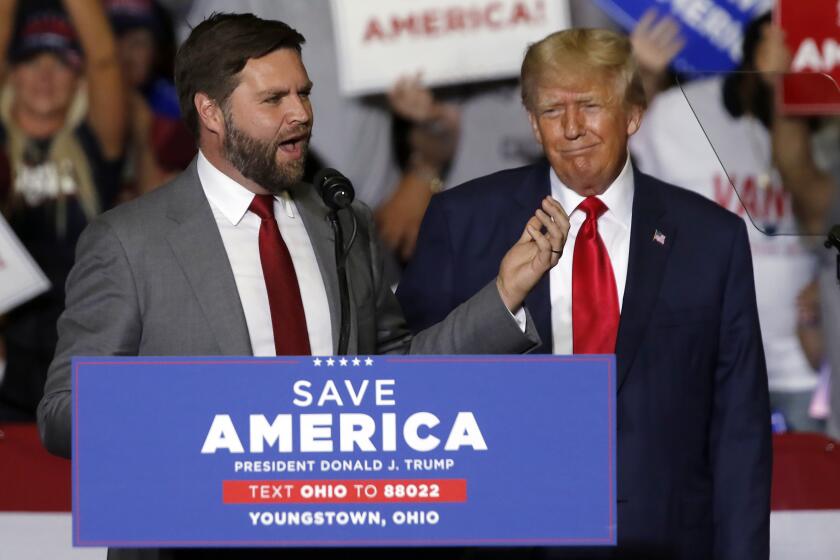J.D. Vance wins Ohio Senate race

- Share via
J.D. Vance, an author and venture capitalist, defeated Rep. Tim Ryan (D-Ohio) in the race for the Ohio Senate seat left vacant by retiring Republican Sen. Rob Portman.
Democrats hoped to upset Republicans in the Buckeye State, but Ohio’s conservative lean was too much for even a moderate like Ryan to overcome.
Vance’s campaign focused heavily on tying Ryan, a longtime member of the House, to Speaker Nancy Pelosi (D-San Francisco) and President Biden.
Ohio, once a swing state, has trended conservative in recent years as former President Trump made inroads with unions. Vance promised Ohioans he would secure the southern border and address the flood of illicit fentanyl coming into the state.
Republicans were on defense in Ohio, so the win doesn’t add to the size of the party’s caucus in the Senate. Instead, the Ohio race was viewed by many conservative strategists as an unnecessary fight given the state’s conservative lean and demographics.
You might think J.D. Vance, the Trump-endorsed author in the U.S. Senate race in Ohio, would be well ahead of Democrat Tim Ryan. But the race is tight, polls show.
“Ohio is whiter than the nation, older than the nation and less educated than the nation. And that combination almost exclusively excludes Democratic success,” David Niven, a professor of political science at the University of Cincinnati, told The Times in September.
But a win is a win for the GOP, which is seeking to block Biden’s agenda in the second half of his term.
Ryan hails from the northeast portion of the state, where he represented the Youngstown area in the House of Representatives for nearly 20 years. He painted himself as an outsider within his party and as someone who is unafraid of challenging Democratic leadership. On the campaign trail, Ryan routinely pointed to his 2016 challenge for the Minority Leader position against Pelosi and his agreement with Trump’s trade policies.
Ryan promised voters he would be tough on China and bring manufacturing jobs back to Ohio.
Vance, famous for his 2015 book “Hillbilly Elegy,” was born in the southwest part of Ohio, in Middletown, a former steel manufacturing town where the economy has declined since many of the mills closed down beginning in the 1970s.
Vance came to fame as a darling of liberal media outlets for his criticisms of Trump and for what some pundits claimed was a special ability to explain the white, working class of the industrial Midwest. But Vance warmed to Trump. He actively sought, and eventually secured, the former president’s backing in the Republican primary.
DeSantis’ win continues a rightward shift for what was once the nation’s largest swing state.
The Ohio Senate race was by all means Vance’s to lose. Trump won the state twice by at least eight percentage points; Ohio has elected a single Democrat, Sen. Sherrod Brown, to statewide office in the past decade.
Vance’s campaign started out slowly, and he proved a lackluster fundraiser. Trump mocked the candidate at a rally in Ohio, saying, “J.D. is kissing my ass.”
Ryan seized on this and ran ads saying Ohio needs an “ass-kicker, not an ass-kisser.” He painted Vance as a candidate in the pocket of Trump and one who allied himself with the fringe elements of the Republican Party. He highlighted Vance’s 2020 election denials and sympathism for Jan. 6 rioters. Ryan also criticized Vance for leaving Ohio to work alongside Peter Thiel in the Bay Area, repeatedly calling him a “San Francisco fraud.”
More to Read
Get the L.A. Times Politics newsletter
Deeply reported insights into legislation, politics and policy from Sacramento, Washington and beyond. In your inbox twice per week.
You may occasionally receive promotional content from the Los Angeles Times.













